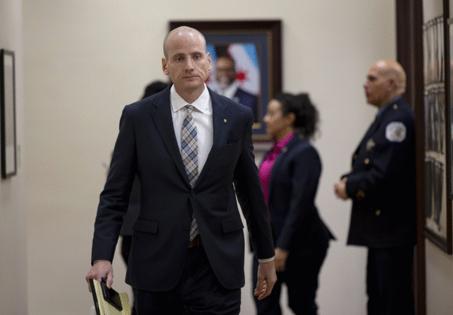Chicago Alderman Jim Gardiner cleared of ethics charge, $20,000 fine; ethics board chair stepping down
Published in News & Features
CHICAGO — After roughly four years of investigations, $20,000 in levied fines, and bureaucratic battles, the Chicago Board of Ethics board cleared 45th Ward Alderman Jim Gardiner this week of allegations that he used city resources to retaliate against a constituent.
The about-face came after a discovery issue led an administrative judge to find the city “failed to establish by a preponderance of the evidence” that Gardiner was liable for any of the alleged violations.
Gardiner told the Tribune he was “really happy to see the truth come to light,” shortly after the board’s decision.
Inspector General Deborah Witzburg’s office concluded roughly two years ago that Gardiner violated the city’s ethics code, alleging he conspired with ward staffers that later worked at the Department of Streets and Sanitation to write bogus citations against Pete Czosnyka for overgrown weeds and rodents at his home on the city’s Northwest Side. The more than $600 in fines levied against Czosnyka were ultimately dropped in municipal court, the Tribune previously reported.
Though Gardiner was not named in the IG’s report, nor in the ethics board’s prior rulings, Czosnyka previously confirmed he had spoken multiple times with the office and believed he was being targeted for criticizing the alderman on his Facebook page, “NWS Examiner.”
Based on the IG’s investigation, and after three interviews with Gardiner in which he rebutted the allegations, the board issued probable cause findings in the fall of 2023 that Gardiner violated his fiduciary duty and misused city property by using those workers to punish a political opponent and later issued a $20,000 fine.
Witzburg highlighted the finding as the first of its kind against a sitting member of the City Council, describing it as “a big deal” and a proof she was following through on a pledge to “more rigorously investigate violations of the ethics ordinance.”
“The power of a public office belongs to the people of the city of Chicago, not to the person sitting in the seat,” she said at the time.
Gardiner appealed. One former worker, only identified as Witness 1, testified in administrative hearings that Gardiner and a ward superintendent had discussed citing Czosnyka for the weeds, but knew they were plants he had bought through a city program years ago. The witness also said she heard two ward superintendents say “the tickets had to come from someone else, otherwise they would land on [Gardiner].”
According to the records from the proceedings at administrative hearings, after witness interviews, the city requested extra information from the IG, including its earlier interview with Witness 1, that could be potentially “exculpatory.”
The city said “additional potentially relevant material has been identified by the OIG and we cannot at this time meet discovery requirement,” and moved to dismiss the charges.
Based on that ruling, the administrative hearing officer, then the board, found Gardiner is “not liable on all counts.”
Witzburg declined to comment.
So did Steve Berlin, the Ethics Board’s executive director, who said “I have no comment other than to reaffirm that the Board remains ever vigilant to act on fully and properly documented instances of intimidation and improper use of office or authority by City officials or employees.”
It’s a rare win in a string of other controversies for the alderman.
Czosnyka and others won a $157,500 settlement after claiming Gardiner unfairly blocked critics from his official Facebook page, which was paid in part by the alderman and partly with taxpayer dollars. Taxpayers also had to pick up the tab for a separate $100,000 settlement to a man that claimed Gardiner had him wrongfully arrested.
Gardiner also publicly apologized for what he described as “offensive” texts using derogatory language against City Council colleagues and women.
In other ethics board news, William Conlon, who has been board chair for nearly a decade, will wrap up his tenure in July.
Conlon is a retired litigator and mediator from the law firm Sidley Austin, a former assistant U.S. attorney turned civil division chief at the U.S. Attorney’s Chicago Office, and a trial practice adjunct professor at Northwestern’s law school.
The board adjudicates violations of the city’s ethics code and gives advice to city employees. While it doesn’t have the power or staff to investigate, it has levied fines or publicly chastised lobbyists, city workers, and elected officials for violations. That’s included significant fines levied against city Treasurer Melissa Conyears-Ervin, a former Obama administration official-turned lobbyist, and the former head of the City Club of Chicago. It has sometimes earned the ire of mayors and aldermen for overreach and conversely, from good government reformers for lacking teeth.
Conlon announced his exit at the board’s June meeting, saying his term was expiring and he would not seek an extension. He described his time on the board as a “privilege and a pleasure,” but added that the city’s current ethics ordinance needed reform.
“It’s a hodgepodge, and somebody needs to take on the task of redoing it and eliminating those things that make no sense,” he said.
____
©2025 Chicago Tribune. Visit at chicagotribune.com. Distributed by Tribune Content Agency, LLC.







Comments